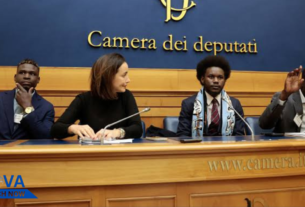As Donald J. Trump starts his second term as President, the world is watching. Will his administration address growing concerns over human rights at home and abroad? With his re-election on January 20th, President Trump faces a call for action from human rights advocates and political leaders. Many Americans also demand it. They want him to address racial inequality, immigration, and global human rights issues.
Trump’s first term saw controversies that drew sharp criticism. They were over his administration’s stance on human rights. Policies like separating migrant families at the U.S.-Mexico border, using force against Black Lives Matter protesters, and withdrawing from the Paris Climate Accord have sparked debate about America’s commitment to rights. These policies, along with divisive rhetoric, raised doubts. Are the U.S. and its commitment to human dignity.
Domestically, advocates are urging the President to prioritize addressing racial and economic disparities. Systemic racism, highlighted by high-profile incidents of police brutality, remains a pressing issue. Civil rights groups want to reform the police and the justice system. They also want fairer access to healthcare and education.
“We need leaders who bridge divides, not deepen them,” said an ACLU spokesperson. Many hope the administration’s second term will rebuild trust in government and deliver justice for marginalized communities.
On immigration, Trump’s policies during his first term significantly reshaped the landscape. The travel bans on mostly Muslim countries and limits on asylum seekers drew global criticism. Advocates are now calling for a more humane approach, particularly in light of global displacement crises. Reforming immigration policy to uphold both security and compassion will be a key test of the President’s leadership.
Internationally, human rights remain a contentious arena. Trump’s ties to authoritarian leaders, like Putin and Kim, raised concerns. People worried about his commitment to defending democracy abroad. Critics note his reluctance to condemn human rights abuses in countries like China. Many label the treatment of Uyghur Muslims there as genocide. The world will seek stronger U.S. leadership. It should hold violators accountable and advocate for universal human rights.
Environmental rights also demand attention. Trump’s withdrawal from the Paris Accord shocked global environmental groups. His administration can now address climate change, which harms vulnerable communities. Many now view environmental justice as a human rights issue. They hope the president will adopt policies that protect the planet and its people.
Observers note that addressing these challenges will require a shift in tone and action. Trump’s second term offers a chance to pivot toward policies that promote unity, fairness, and accountability. “A political analyst said, ‘The president can set a new course. But it will require political will and a commitment to change.'”
Critics are skeptical. Supporters argue that Trump’s focus on growth and security will enable broader progress. His administration touts its achievements. They include criminal justice reform under the First Step Act. It also increased funding for historically Black colleges and universities. These steps, they argue, show that meaningful change is possible.
As Trump embarks on his second term, the stakes are high. His approach to human rights will not only shape his legacy but also influence America’s standing in the world. Balancing domestic needs with international obligations will be critical. The path ahead demands action, not just words. This challenge will test the administration’s resolve in the years to come.




